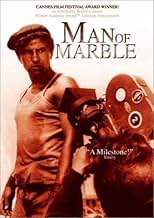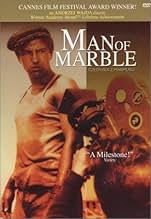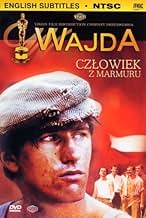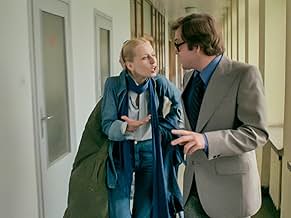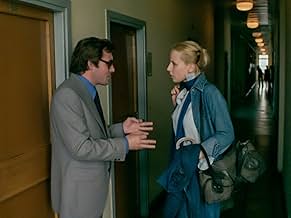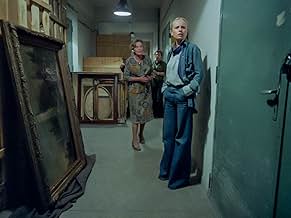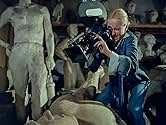IMDb RATING
7.7/10
5K
YOUR RATING
A young Polish filmmaker sets out to find out what happened to Mateusz Birkut, a bricklayer who became a propaganda hero in the 1950s but later fell out of favor and disappeared.A young Polish filmmaker sets out to find out what happened to Mateusz Birkut, a bricklayer who became a propaganda hero in the 1950s but later fell out of favor and disappeared.A young Polish filmmaker sets out to find out what happened to Mateusz Birkut, a bricklayer who became a propaganda hero in the 1950s but later fell out of favor and disappeared.
- Director
- Writer
- Stars
- Awards
- 4 wins & 1 nomination total
- Director
- Writer
- All cast & crew
- Production, box office & more at IMDbPro
Featured reviews
Wajda's MAN OF MARBLE is one of the most compelling attacks on government corruption that I have ever seen. It is a "Citizen Kane"-styled story of a female film student who tries to trace the history of Birkut, a long-forgotten "hero" of the Polish Communist government.
She begins by viewing propaganda film that praises Birkut as a devout worker who slaves away at brick-laying for the officials. He has the appearance of a vigilant, Hercules-like strongman who breezes through the labor without breaking a sweat. Then she goes to interview the director, who was hired by the government. He tells her about the reality of making the film, such as how Birkut was given extra food and water (unlike the other bricklayers). Wajda uses these two conflicting scenes to deconstruct the false imagery that propaganda gives its viewers. He shows us how officials manipulate such situations to their own political good.
The student goes on to interview other subjects who describe the brutal reality of Birkut's off-camera existence. In one devastating scene, she meets his wife, who breaks down and tries to avoid being interviewed. As the truth becomes clearer and clearer, the government begins to intercede in the production of the student's film.
Wajda was a film-maker who was not afraid to criticize the harsh Polish government that eventually was defeated by individuals such as Lech Walesa. MAN OF MARBLE is a testament to those who had to live through the oppression of Communism, and also to those who are still living under its iron fist.
She begins by viewing propaganda film that praises Birkut as a devout worker who slaves away at brick-laying for the officials. He has the appearance of a vigilant, Hercules-like strongman who breezes through the labor without breaking a sweat. Then she goes to interview the director, who was hired by the government. He tells her about the reality of making the film, such as how Birkut was given extra food and water (unlike the other bricklayers). Wajda uses these two conflicting scenes to deconstruct the false imagery that propaganda gives its viewers. He shows us how officials manipulate such situations to their own political good.
The student goes on to interview other subjects who describe the brutal reality of Birkut's off-camera existence. In one devastating scene, she meets his wife, who breaks down and tries to avoid being interviewed. As the truth becomes clearer and clearer, the government begins to intercede in the production of the student's film.
Wajda was a film-maker who was not afraid to criticize the harsh Polish government that eventually was defeated by individuals such as Lech Walesa. MAN OF MARBLE is a testament to those who had to live through the oppression of Communism, and also to those who are still living under its iron fist.
So many film students have wasted their time trying to study "Kane" as a character study and as a satire. But it wasn't really either of those things, but an experiment in depth for the camera and narrative structures. The frequent comparison between that film and this one makes a lot of sense superficially; the newsreel footage, the interviewees made up to look 20 years older.
But Agniezcka is making a film, rather than a piece for a newspaper: journalism vs. art, capitalism vs. socialism. Although the journalists in "Kane" said otherwise, they were never seeing "who he was" rather "what he was like" ie. his behaviour, how others perceived him etc. Here we have something broader, examining a man confronting society, confronting his friends, and confronting himself all at the same time. Newspaper journalism tells us what something is like. Good documentary strives to really define what or who something was.
This is a highly intelligent structure, moreso than his previous works and moreso even than "Kane." As a meditation on film-making, it moves gracefully from the shots captured by Agniezcka's cinematographer, and the shots of Wajda himself, forcing us to draw parallels.
It's a shame Wajda remains largely unknown. Perhaps the up-coming Criterion set of his "War Trilogy" will change that.
4 out of 5 - An excellent film
But Agniezcka is making a film, rather than a piece for a newspaper: journalism vs. art, capitalism vs. socialism. Although the journalists in "Kane" said otherwise, they were never seeing "who he was" rather "what he was like" ie. his behaviour, how others perceived him etc. Here we have something broader, examining a man confronting society, confronting his friends, and confronting himself all at the same time. Newspaper journalism tells us what something is like. Good documentary strives to really define what or who something was.
This is a highly intelligent structure, moreso than his previous works and moreso even than "Kane." As a meditation on film-making, it moves gracefully from the shots captured by Agniezcka's cinematographer, and the shots of Wajda himself, forcing us to draw parallels.
It's a shame Wajda remains largely unknown. Perhaps the up-coming Criterion set of his "War Trilogy" will change that.
4 out of 5 - An excellent film
Ironic, tongue-in-cheek, smart and a tad too long, "Man of Marble" is a good movie that can't help being a little bit too much in love with itself, on top of being unable to know where to stop, thus ending being a little bit repetitive.
Agnieszka, a university student doing her diploma film, decides to investigate in the past of long forgotten hero of the people Birkut. Her search brings her to discover a lot about a man that was put in a pedestal to then be forgotten and erased from the history of the nation.
Wajda does not use a lot of subtlety in this film, but who needs it when the script is smart enough, the direction top notch, with some great shots and a pace that is sometimes close to an action movie, and there is really good acting (in particular our hero, Agnieszka, played with a lot of sass and confidence by Krystyna Janda). The score and the use of locations is also great.
However, the movie clocks at over two hours and a half, and the ideas behind the movie: the use of unknown people by the ones in power as little more than toys, destroying lives and dreams without a second of remorse, the difficulty to fight the system or the way paranoia extends everywhere in some regimes become undone by repetition and by a story that starts to spin on its wheels around the 1 hour and a half mark.
It is totally worth checking though. Just be sure to have enough time (you may want to have some breaks).
Agnieszka, a university student doing her diploma film, decides to investigate in the past of long forgotten hero of the people Birkut. Her search brings her to discover a lot about a man that was put in a pedestal to then be forgotten and erased from the history of the nation.
Wajda does not use a lot of subtlety in this film, but who needs it when the script is smart enough, the direction top notch, with some great shots and a pace that is sometimes close to an action movie, and there is really good acting (in particular our hero, Agnieszka, played with a lot of sass and confidence by Krystyna Janda). The score and the use of locations is also great.
However, the movie clocks at over two hours and a half, and the ideas behind the movie: the use of unknown people by the ones in power as little more than toys, destroying lives and dreams without a second of remorse, the difficulty to fight the system or the way paranoia extends everywhere in some regimes become undone by repetition and by a story that starts to spin on its wheels around the 1 hour and a half mark.
It is totally worth checking though. Just be sure to have enough time (you may want to have some breaks).
Andrzej Wajda has always impressed me, and his war trilogy are among the best and most essential films in the history of cinema, but "Man of Marble" is an ambitious, interesting idea that isn't realized very well in script or in terms of the finished product.
The most interesting aspect of "Man of Marble" outside of the much-examined similarities to "Citizen Kane" is how subversive it is. I wonder how this was ever released in Poland at the time, and the scenes in the film where I felt Wajda really did succeed as a director is where he contrasts Soviet propaganda with the actual events- very powerful. Wajda fails more than he succeeds with this particular film though, it's a disjointed narrative and it takes tremendous skill to keep the audience interested in both stories. Sure, one may argue that "Man of Marble" isn't intended as entertainment, but even in the context of art-house cinema this film is only engaging in parts, with Agnieszka's attempt to make this film ending up far more interesting than the film she's making.
I can see where Wajda is going with the way he shot this film, but it just doesn't work very well, and the score for this film has to be one of the worst matches I've ever come across. It's ludicrous.
Something of a companion piece by the same writer and director, I found "Man of Iron" far more engaging and impressive.
5/10
The most interesting aspect of "Man of Marble" outside of the much-examined similarities to "Citizen Kane" is how subversive it is. I wonder how this was ever released in Poland at the time, and the scenes in the film where I felt Wajda really did succeed as a director is where he contrasts Soviet propaganda with the actual events- very powerful. Wajda fails more than he succeeds with this particular film though, it's a disjointed narrative and it takes tremendous skill to keep the audience interested in both stories. Sure, one may argue that "Man of Marble" isn't intended as entertainment, but even in the context of art-house cinema this film is only engaging in parts, with Agnieszka's attempt to make this film ending up far more interesting than the film she's making.
I can see where Wajda is going with the way he shot this film, but it just doesn't work very well, and the score for this film has to be one of the worst matches I've ever come across. It's ludicrous.
Something of a companion piece by the same writer and director, I found "Man of Iron" far more engaging and impressive.
5/10
"Czlowiek z marmuru" ("Man of Marble") goes to tells us the story of a filmmaker (Krystyna Janda) who wants to make as a film thesis a documentary about one of the heroes of Poland's communist regime, a simple man named Mateusz Birkut (Jerzy Radziwilowicz), a bricklayer who was famous for building housing for all the people, and that made him a cult figure in his country. She is trying to find Birkut, a popular figure that vanished without any explanation and she'll try to discover what happened with this mythic figure. Interviewing those who knew him and watching old footage of him, the filmmaker will make a great work about this man but her bosses who owns the funds (the Socialist government funds) for the film's realization are not very happy with her film, thinking that this might be a damaging project for them.
If the story sounds a little like "Citizen Kane" well, be ready for countless flashbacks, back and forth in the past of Birkut, and an almost inconclusive ending just like Welles masterpiece. But wait! The ending of this journey appears in "Man of Iron" (1981), also directed by the great Andrzej Wajda.
"Man of Marble" (term that refers to the propagandistic marble statues made in Birkut's image) is a powerful and brilliant story about the importance of past in the lives of everyone, it's the thing that makes us look for the future with better eyes, and in the film, we are constantly dragged down to it in order to get some answers about Birkut's future: Is he alive? Is he dead? Why he disappeared? Not just that, it is a great accomplish in showing how documentaries are made, both the protagonist work but the ones made up by the government, where Birkut and his friends were "trained" to appear important in front of camera. And, of course, a political and historical background that reveals many things about Poland and how strict the society were back in the 1950's and even in the 1970's with an absolute control on everything filmed, said and all.
Unique in many senses, "Man of Marble" present us the sad reality of Communism with masked realities where everything presented as good but in the surface it wasn't all good, and Birkut realizes that after a painful incident and after the suspicion that his friend was a spy, something that he never agreed, and that made him fight with the ones who put him on a good position among people, the government.
It is a well made film, with terrific performances by the cast, and a magnificent screenplay that knows how to evoke many times, many periods of Poland without being confusing (something that was problematic in its sequel), everything works fine. Bravo, Mr. Wajda. 10/10
If the story sounds a little like "Citizen Kane" well, be ready for countless flashbacks, back and forth in the past of Birkut, and an almost inconclusive ending just like Welles masterpiece. But wait! The ending of this journey appears in "Man of Iron" (1981), also directed by the great Andrzej Wajda.
"Man of Marble" (term that refers to the propagandistic marble statues made in Birkut's image) is a powerful and brilliant story about the importance of past in the lives of everyone, it's the thing that makes us look for the future with better eyes, and in the film, we are constantly dragged down to it in order to get some answers about Birkut's future: Is he alive? Is he dead? Why he disappeared? Not just that, it is a great accomplish in showing how documentaries are made, both the protagonist work but the ones made up by the government, where Birkut and his friends were "trained" to appear important in front of camera. And, of course, a political and historical background that reveals many things about Poland and how strict the society were back in the 1950's and even in the 1970's with an absolute control on everything filmed, said and all.
Unique in many senses, "Man of Marble" present us the sad reality of Communism with masked realities where everything presented as good but in the surface it wasn't all good, and Birkut realizes that after a painful incident and after the suspicion that his friend was a spy, something that he never agreed, and that made him fight with the ones who put him on a good position among people, the government.
It is a well made film, with terrific performances by the cast, and a magnificent screenplay that knows how to evoke many times, many periods of Poland without being confusing (something that was problematic in its sequel), everything works fine. Bravo, Mr. Wajda. 10/10
Did you know
- TriviaThe award Burski is flaunting at the airport on his return was Wajda's own award, hence Burski is a mock self-portrait.
- ConnectionsEdited into Sauve la vie (qui peut) (1981)
- How long is Man of Marble?Powered by Alexa
Details
- Runtime2 hours 45 minutes
- Color
- Sound mix
- Aspect ratio
- 1.37 : 1
Contribute to this page
Suggest an edit or add missing content



